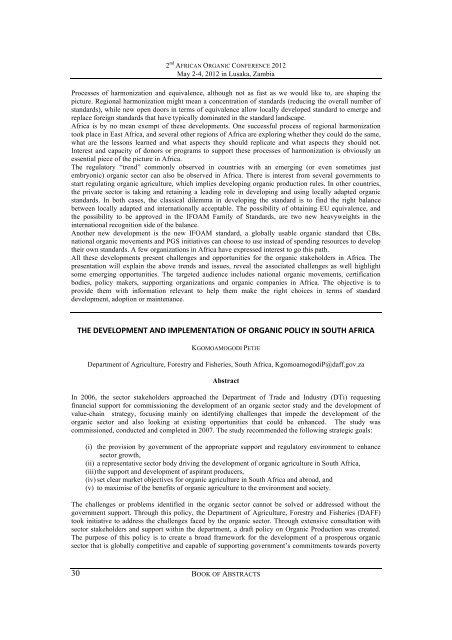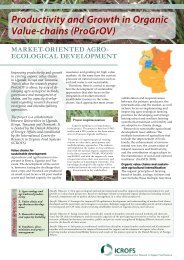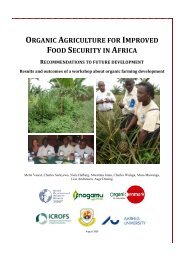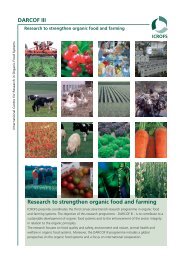The 2nd African Organic Conference â Mainstreaming ... - ICROFS
The 2nd African Organic Conference â Mainstreaming ... - ICROFS
The 2nd African Organic Conference â Mainstreaming ... - ICROFS
You also want an ePaper? Increase the reach of your titles
YUMPU automatically turns print PDFs into web optimized ePapers that Google loves.
2 nd AFRICAN ORGANIC CONFERENCE 2012<br />
May 2-4, 2012 in Lusaka, Zambia<br />
Processes of harmonization and equivalence, although not as fast as we would like to, are shaping the<br />
picture. Regional harmonization might mean a concentration of standards (reducing the overall number of<br />
standards), while new open doors in terms of equivalence allow locally developed standard to emerge and<br />
replace foreign standards that have typically dominated in the standard landscape.<br />
Africa is by no mean exempt of these developments. One successful process of regional harmonization<br />
took place in East Africa, and several other regions of Africa are exploring whether they could do the same,<br />
what are the lessons learned and what aspects they should replicate and what aspects they should not.<br />
Interest and capacity of donors or programs to support these processes of harmonization is obviously an<br />
essential piece of the picture in Africa.<br />
<strong>The</strong> regulatory “trend” commonly observed in countries with an emerging (or even sometimes just<br />
embryonic) organic sector can also be observed in Africa. <strong>The</strong>re is interest from several governments to<br />
start regulating organic agriculture, which implies developing organic production rules. In other countries,<br />
the private sector is taking and retaining a leading role in developing and using locally adapted organic<br />
standards. In both cases, the classical dilemma in developing the standard is to find the right balance<br />
between locally adapted and internationally acceptable. <strong>The</strong> possibility of obtaining EU equivalence, and<br />
the possibility to be approved in the IFOAM Family of Standards, are two new heavyweights in the<br />
international recognition side of the balance.<br />
Another new development is the new IFOAM standard, a globally usable organic standard that CBs,<br />
national organic movements and PGS initiatives can choose to use instead of spending resources to develop<br />
their own standards. A few organizations in Africa have expressed interest to go this path.<br />
All these developments present challenges and opportunities for the organic stakeholders in Africa. <strong>The</strong><br />
presentation will explain the above trends and issues, reveal the associated challenges as well highlight<br />
some emerging opportunities. <strong>The</strong> targeted audience includes national organic movements, certification<br />
bodies, policy makers, supporting organizations and organic companies in Africa. <strong>The</strong> objective is to<br />
provide them with information relevant to help them make the right choices in terms of standard<br />
development, adoption or maintenance.<br />
THE&DEVELOPMENT&AND&IMPLEMENTATION&OF&ORGANIC&POLICY&IN&SOUTH&AFRICA&<br />
KGOMOAMOGODI PETJE<br />
Department of Agriculture, Forestry and Fisheries, South Africa, KgomoamogodiP@daff.gov.za<br />
Abstract<br />
In 2006, the sector stakeholders approached the Department of Trade and Industry (DTi) requesting<br />
financial support for commissioning the development of an organic sector study and the development of<br />
value-chain strategy, focusing mainly on identifying challenges that impede the development of the<br />
organic sector and also looking at existing opportunities that could be enhanced. <strong>The</strong> study was<br />
commissioned, conducted and completed in 2007. <strong>The</strong> study recommended the following strategic goals:<br />
(i) the provision by government of the appropriate support and regulatory environment to enhance<br />
sector growth,<br />
(ii) a representative sector body driving the development of organic agriculture in South Africa,<br />
(iii) the support and development of aspirant producers,<br />
(iv) set clear market objectives for organic agriculture in South Africa and abroad, and<br />
(v) to maximise of the benefits of organic agriculture to the environment and society.<br />
<strong>The</strong> challenges or problems identified in the organic sector cannot be solved or addressed without the<br />
government support. Through this policy, the Department of Agriculture, Forestry and Fisheries (DAFF)<br />
took initiative to address the challenges faced by the organic sector. Through extensive consultation with<br />
sector stakeholders and support within the department, a draft policy on <strong>Organic</strong> Production was created.<br />
<strong>The</strong> purpose of this policy is to create a broad framework for the development of a prosperous organic<br />
sector that is globally competitive and capable of supporting government’s commitments towards poverty<br />
30<br />
BOOK OF ABSTRACTS





